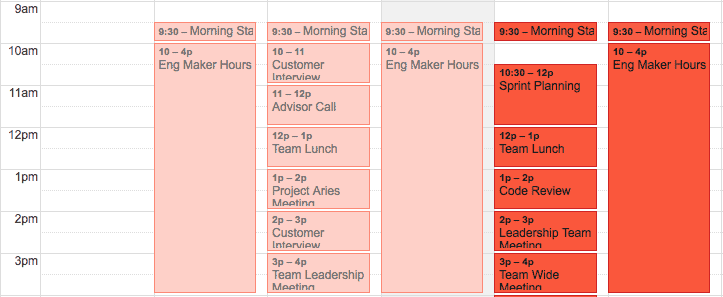Congratulations! You got the promotion to manager. Unfortunately, everything you know as an individual contributor is about to be turned on its ear. Many of the skills that made you succeed before won't help you now. The demands for your time, who you have to worry about, and how to get results are all different.
Last week, we talked about the key mindsets of great managers. As important as shifting your mindsets are, adapting to the new tasks and challenges you have on a day to day basis matter quite a bit, too. Here are 3 of them I dealt with early in my career and how you can overcome them as well.
The Biggest Challenges for First-Time Managers
1) Maker vs. Manager hours
In order to do creative work, you need time to get into a flow and examine the different aspects of a problem or solution. This is at the heart of maker's hours as written about by Y Combinator's founder, Paul Graham. Getting into the flow does not happen in a minute, which is why you want to try not to interrupt your team members who are makers in the middle of their morning or afternoons.
As a manager, you're now in what is aptly called, "manager hours." Your time is now segmented into hour long blocks, which are often filled with meeting after meeting. This can make it really hard to get anything done if you're not careful. You can easily end up with meetings all day every day as a friend of mine relayed once: we met up for drinks after he had a day of 16 thirty minute meetings. He was mentally fried, and had to then go home to do his work for the day.
What to do: Don't be afraid to schedule Maker time just like you do all those manager meetings. By blocking it off on your calendar, you can ensure that you actually can have a nice block of uninterrupted time to do important work like high level strategy decisions for your team, do some remaining individual contributor tasks, or consider creative ideas to solutions to problems. This is why Heroku created Maker's days.

2) Dealing with other people's problems
I know. We're all adults at our jobs. We should be able to handle our own problems. Unfortunately, that's not how it actually works in reality. There are politics. Personalities clash. Personal issues bleed into and affect your work day. As a first time manager, suddenly everyone else's problems on your team are your problems. It can be overwhelming.
Making matters worse, if you let small issues slip, they will grow. A slightly frustrated employee can slip into the early stages of burn out. An unhappy team member might say yes to their friend encouraging them to interview at their company. Two team members clashing can lead to the whole team taking sides, affecting everyone's attitudes and productivity. I've seen these things happen to my friends and I, and when they're allowed to fester, they never ended well for our managers, our companies, or ourselves.
What to do: Accept that issues will arise and work to fix problems when they're small. They're often a lot simpler when you first hear about an issue between two people versus trying to unravel a major spat, repair a divided team, or replacing a quitting employee.
This is also why one on ones are so important. If you don't give them a regular, low-pressure forum to bring up these issues, you won't hear about them until they're huge problems. You also must follow through on what you talk about, or you'll lose their trust and the problems you're aware of will fester.
3) Empowering, not doing
If you get promoted to manager, it's probably because you're awesome. High five! You probably took charge of situations and always got your work done. You probably even had someone in the company talk about your potential and upward career trajectory.
Unfortunately, if you're the meticulous type that always did all the work in group projects in school, you probably really struggle with what your team really needs today: Someone to guide them and help them at a high level, but trust them to do the work the best way they see fit. As tempting as it is to tell your team members the answer to everything, what you really want to do is help them figure it out themselves.
When I first started out as a manager, it was always tempting to jump in and get overly involved in their work. I still loved a lot of the work and had a hard time not wanting to do it. However, the more I resisted and trusted my team, the more I was thrilled by just seeing how much more my team could do when I set them up for success than if I tried to do it all myself.
What to do: Take a step back and look for every opportunity to trust your team to figure it out. Give them clear goals and hold the bar for quality where you need it to be, but don't do the work for them.
You should be a resource to answer questions and guide them. Then, sit back and watch how much more engaged and motivated they are because you trust them to deliver. Then, all you need to do is close the loop by praising them when they do the caliber of work you expect.
Are you growing as a leader? Are you building the skills you need?
Get better as a leader every day with our bite-size leadership training programs, Lighthouse Lessons. Purpose built for busy managers like you, they help you become a better leader by mastering the skills that bring out the best in your team. You can learn more and sign up here.







